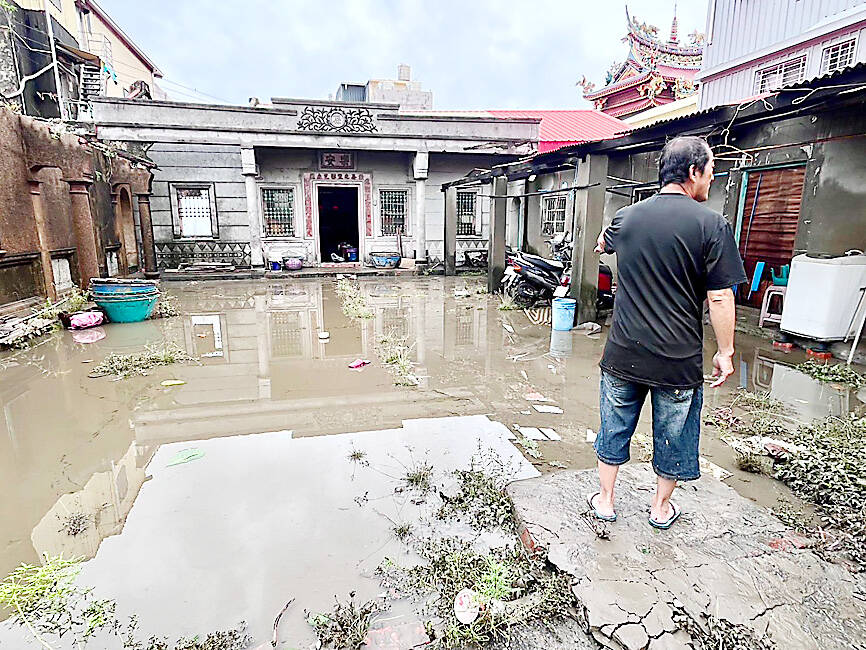Wear protective clothing and do not walk barefoot or wear slippers while cleaning up flood-damaged areas after Typhoon Danas to prevent the spread of melioidosis, Centers for Disease Control (CDC) Deputy Director-General Philip Lo (羅一鈞) said yesterday.
Melioidosis — which is caused by Burkholderia pseudomallei, a bacterium commonly found in soils and waterlogged environments — is transmitted mainly by contact through cuts on the skin or inhalation when people are exposed to contaminated soil or water.
Typhoons, such as Danas, which hit Taiwan on Sunday, disturb soil and release pathogens underneath. The number of melioidosis cases usually spikes within a month following a typhoon due to inhalational infection.

Photo courtesy of Chien Huan-tsung
Sixty-nine cases of melioidosis were reported a month after Typhoon Gaemi hit Taiwan last year, 13 of whom died from the disease, Lo said.
A total of 119 local melioidosis cases were recorded throughout last year, including 24 deaths, a record high, he said.
Eighty-nine of those cases, including 18 of the deaths, were recorded in Kaohsiung, 14 cases and four deaths in Tainan and five cases and one death in Taichung, he said.
To prevent the spread of the disease, people should not wear slippers or go barefoot while cleaning up after the typhoon, and should instead wear waterproof boots and gloves, Lo said.
They must also wear a mask to prevent infection through inhalational, Lo said.
People should also take care to avoid rusty objects like iron nails or corrugated metal to prevent contracting melioidosis, leptospirosis or tetanus through cuts, he said.
People with lung, liver or kidney diseases, diabetes, cancer or compromised immune systems are more likely to develop severe cases if infected, he said.
They should stay indoors as much as possible with windows closed, and wear a mask indoors and outdoors to avoid inhaling dust or water droplets carrying the bacterium, he said.
The CDC also warned of the risk of dengue fever, as stagnant water left after the typhoon creates hotbeds for mosquitoes.
The first week after a typhoon would be the critical period for preventing dengue, it said, urging people to check for containers that have collected water, drain them and scrub mosquito eggs from them.
The CDC also urged people to boil water before drinking to prevent intestinal infections, as water towers could become contaminated by dirty water, adding that towers should be drained and disinfected before they are refilled.

Taiwanese scientists have engineered plants that can capture about 50 percent more carbon dioxide and produce more than twice as many seeds as unmodified plants, a breakthrough they hope could one day help mitigate global warming and grow more food staples such as rice. If applied to major food crops, the new system could cut carbon emissions and raise yields “without additional equipment or labor costs,” Academia Sinica researcher and lead author the study Lu Kuan-jen (呂冠箴) said. Academia Sinica president James Liao (廖俊智) said that as humans emit 9.6 billion tonnes of carbon dioxide compared with the 220 billion tonnes absorbed

The Taipei Mass Rapid Transit (MRT) Wanda-Zhonghe Line is 81.7 percent complete, with public opening targeted for the end of 2027, New Taipei City Mayor Hou You-yi (侯友宜) said today. Surrounding roads are to be open to the public by the end of next year, Hou said during an inspection of construction progress. The 9.5km line, featuring nine underground stations and one depot, is expected to connect Chiang Kai-shek Memorial Hall Station to Chukuang Station in New Taipei City’s Jhonghe District (中和). All 18 tunnels for the line are complete, while the main structures of the stations and depot are mostly finished, he

Taipei is to implement widespread road closures around Taipei 101 on Friday to make way for large crowds during the Double Ten National Day celebration, the Taipei Department of Transportation said. A four-minute fireworks display is to be launched from the skyscraper, along with a performance by 500 drones flying in formation above the nearby Nanshan A21 site, starting at 10pm. Vehicle restrictions would occur in phases, they said. From 5pm to 9pm, inner lanes of Songshou Road between Taipei City Hall and Taipei 101 are to be closed, with only the outer lanes remaining open. Between 9pm and 9:40pm, the section is

China’s plan to deploy a new hypersonic ballistic missile at a Chinese People’s Liberation Army Rocket Force (PLARF) base near Taiwan likely targets US airbases and ships in the western Pacific, but it would also present new threats to Taiwan, defense experts said. The New York Times — citing a US Department of Defense report from last year on China’s military power — on Monday reported in an article titled “The missiles threatening Taiwan” that China has stockpiled 3,500 missiles, 1.5 times more than four years earlier. Although it is unclear how many of those missiles were targeting Taiwan, the newspaper reported